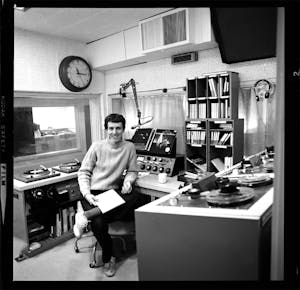In the late morning, walk along the Drag on the University of Texas at Austin campus, near West Dean Keeton Street, and you might hear wafting through the air the beautiful sounds of an “art song.” This musical form, a narrative-based arrangement performed with a piano and a solo voice, was popularized during the early nineteenth century by the likes of the Austrian composer Franz Schubert, who wrote more than six hundred of them. The person singing is sure to be John Aielli, the erudite and quirky 6 to 9 a.m. disc jockey on KUTX, just standing there, outside the office, singing to no one in particular, and without a piano, of course.
Since 1966, Aielli has been a fixture at the station (previously KUT), where his show Eklektikos, a mix of talk radio and music, has aired since 1970 in a variety of iterations and time slots. On Tuesday KUTX will host the John Aielli 50th Anniversary Concert. It’s a celebration of Aielli’s half-century of advancing Austin’s cultural offerings against the backdrop of the newest pop and the oldest classical. And yet all along, Aielli has harbored aspirations of being the one who makes the music instead of simply championing others’ talents.
“I’m a singer,” Aielli says. “I’ve worked to learn how to use my voice for years and years and years. I used to practice in the stairwell when we were in the building across the street. But that got to be difficult when they turned it into an academic building. It bothered the students. And I can’t sing anywhere in this building. So I’ve taken to just singing outside.”
For some thirteen years during the seventies and eighties, Aielli trained under various vocal coaches at the university, including the opera singer Jess Walters. He learned German and other languages in the canon of art songs. He was angling to break free from Austin and head to New York to try and break in to the biz. But in 1984, when he was 38 years old, the house where he rented an apartment, at Martin Luther King Jr. Boulevard and Nueces Street, burned to the ground. He took it as a sign and decided he needed to give up on the dream.
Aielli was born in 1946, in Cincinnati, Ohio, to a father who was a piano player and a mother who had been a telephone operator by day and a jazz singer by night. The couple had met in Belton, during World War II, when Aielli’s dad was assigned to Fort Hood. He played as part of the USO, often accompanied at night at the piano bar by his soon-to-be wife. Once he got out of the Army, the couple moved to Cincinnati and married. When Aielli was around eight years old, the family moved back to Central Texas.
Aielli grew up in Killeen singing in the school choir. His junior high choir teacher, George Uland, told him that a singer is not a singer unless he could also play the piano. So at age twelve, Aielli began studying piano. Uland was impressed with his ability and arranged for him to take lessons under Louis Galanffy. A former apprentice of the great Hungarian composer and pianist Béla Bartók, Galanffy had fled the Hungarian Revolution of 1956 and was at the time teaching at Mary Hardin-Baylor College (now the University of Mary Hardin-Baylor).
After five years, Aielli got it in his head that he was going to be a classical pianist. He auditioned for scholarships at various Texas colleges and was lucky to earn one at his coveted school, the University of Texas. The only problem was that the scholarship covered just tuition and fees, not room and board. That was a deal-breaker for Aielli. His family didn’t have the means. He stayed home and started looking for jobs to save up money to get back to Austin someday.
“I wound up walking into KLEN radio, in Killeen, thinking, ‘Can I get a job as a janitor or something?’” Aielli opines. “But the station manager, A.W. Stewart, put me behind the microphone immediately and he said, ‘You’re hired.’ I was told I was going to be an announcer. He said I was starting the next day. My God. So that’s how I started, when I was seventeen. I think he just liked the sound of my voice.”

Aielli cut his teeth at KLEN, delivering radiograms and hosting shows in all sorts of genres: classical, country, gospel, rock and roll. He was working 96 hours a week for 30 cents an hour, and on the side, he was commuting to Temple Junior College. Part of what kept him staying busy 24/7 was likely the fact that he still lived at home.
Classical music came naturally to Aielli. As a kid, he once begged his mom to buy him a copy of Mozart’s Requiem at the Piggly Wiggly. At around eight years old, he tried to take advantage of a Columbia Records ad in Reader’s Digest offering three free records (only to find out later that he needed to join the club, which he refused to do in the end). Those three records—Brahms’s Fourth Symphony, the Saint-Saëns Violin Concerto No. 3 with Paganini No. 1, and Beethoven’s Emperor Concerto—influenced him in a major way.
After graduating from junior college, Aielli finally had the funds to go to Austin and continue his education. By now he had divorced the piano. Aielli’s father, despite being a musician himself, opposed anything his son did related to music. Aielli had to go to extremes to practice, doing it only when his dad wasn’t around. Finally, after Aielli had performed an important recital, his dad acknowledged his talent and encouraged him to pursue it. “Frankly, it was just because he said I should do it that I determined I would not do it,” Aielli explains.
Aielli enrolled at UT in 1966 and began working at KUT immediately. He played classical music all the time initially. His childhood infatuation with the form had blossomed during his time at KLEN. There he could buy promotional records for fifty cents, sometimes a quarter. Even though money was tight, he amassed a collection of more than a thousand records. Because he hadn’t a clue at that point, he turned to Consumer Reports to determine which albums were supposed to be good. That was the foundation upon which Aielli learned classical music.

But as Eklektikos evolved, he began to introduce other genres—popular music. He wanted to bridge the divide between the two disparate audiences. “This was a challenge in the sense that I wanted to soften up the austere, elitism of classical music,” Aielli says, “which just makes me sick—the business where you have to be all prim and proper, and it’s only for rich people and all that kind of stuff. That’s been one of my main goals, is to break that down as much as I can and get more people to listen to classical music—and it’s the same regarding the austere classical people, get them to loosen up.”
When Aielli isn’t playing music, he’s talking, and John Aielli likes to talk. Sometimes his smarts overwhelm him. Sometimes his daily perusal of the New York Times and nearly two hours of book-reading fill him with too much information to tangle with on the air. And perhaps sometimes it’s just the residual effect of all the headstands he used to do in the station at night, when hardly anyone else was around, as part of his daily 42-year-long yoga regimen. Whatever the case, Aielli has a gift for gab. The man can deliver an aphorism then break down the etymology of a word without missing a beat. To prove it, there is a ShitJohnAielliSays Twitter account, created by Jake Patoski, whose father, Joe Nick Patoski, was a longtime Texas Monthly writer.

Aielli has interviewed some great Texans, like Dan Rather (“After he left, he sent me this big old pot of flowers and I just thought that was so nice”), Ann Richards (“Her shtick, so to speak, was not a shtick at all; that’s just who she was”), and Matthew McConaughey (“He was probably twenty-four or something like that, and he came in wearing this cut-off T-shirt, with his muscles showing and his belly button showing—and he did not use deodorant”).
For the anniversary concert on Tuesday, an array of musicians will fete Aielli. There will be live performances from Shinyribs, Hayes Carll, Carrie Rodriguez, Bob Schneider, and Graham Reynolds. Tuesday will be special in more ways than one. It will also be Aielli’s seventy-first birthday. Kevin Russell, of Shinyribs, who upon hearing Aielli play Brahms’s Intermezzo Op. 117 No. 1 decided with his fiancé to make it the processional music at their wedding, got him a present.
“John Aielli is a free-form shepherd in a world of format sheep,” Russell says. “I have written a song especially for this event. It is humorous and a bit sentimental, a waltz. It is a song that once and for all teaches everyone how to spell his last name. The song is ‘A-I-E-L-L-I.’”
Hogg Auditorium, March 7, 7 p.m., kutx.org
Other Events Across Texas
AUSTIN
Snap, Crackle, Pop-Up
The Pop-Up Magazine, an extension of the award-winning California Sunday Magazine, doesn’t exist in print at all, but instead as an unrecorded, one-night-only live stage performance featuring elite cultural commentators, which in Austin will include such Texans as three-time Grammy winner Shawn Colvin and Texas Monthly’s own executive editor Skip Hollandsworth.
The Paramount Theatre, March 4, 7 p.m., popupmagazine.com
CORPUS CHRISTI
Word Choice
The Corpus Christi Literary Reading Series has hosted national writing stars including T.C. Boyle, Grace Paley, and Larry McMurtry, but now in its thirtieth year, the series is keeping it close to home, with two native sons: Stephen Harrigan, whose forthcoming book, They Came From the Sky, tells of the Karankawa Indians who inhabited Texas coastal land including the Corpus Christi area, and Bret Anthony Johnston, whose 2004 short story collection was titled Corpus Christi.
The Art Museum of South Texas, March 4, 7 p.m., ccliteraryreadingseries.com
DALLAS
Down In a Hole
This is the closing weekend of Northside Hollow, the acclaimed play by Brenda Withers and Fort Worth native Jonathan Fielding, about a novice first responder who attempts to rescue a trapped miner. That means this is your last chance to become one of the lucky 45 audience members who gets to don a headlamp and be a part of the life-saving action during the three final performances.
Amphibian Stage Productions, March 3 & 4, 8 p.m. and March 5, 2 p.m., amphibianstage.com
MARFA
Myth Busters
If you can deal with all the hipster tourists that the Marfa Myths festival attracts, you stand to reap a wicked mix of music, art, and Marfa chill, this year featuring a performance by Roky Erickson and the Hounds of Baskerville, an exhibition showcasing Alexander Calder’s rarely seen audible mobile Clangors, and, of course, plenty of yoga and sound-meditation sessions.
Various locations, March 9–12, marfamyths.com
SAN ANTONIO
Print This
It’s true: the more art you own, the smarter you’ll be—or at least the smarter those around you will think you are. That’s why it’s a smart idea to attend the McNay Print Fair, where more than a dozen galleries from across the country will have a bounty of prints, drawings, watercolors, and photographs for sale, all at a reasonable price.
McNay Art Museum, March 4, 10 a.m., mcnayart.org
- More About:
- San Antonio
- Marfa
- Dallas
- Corpus Christi
- Austin






